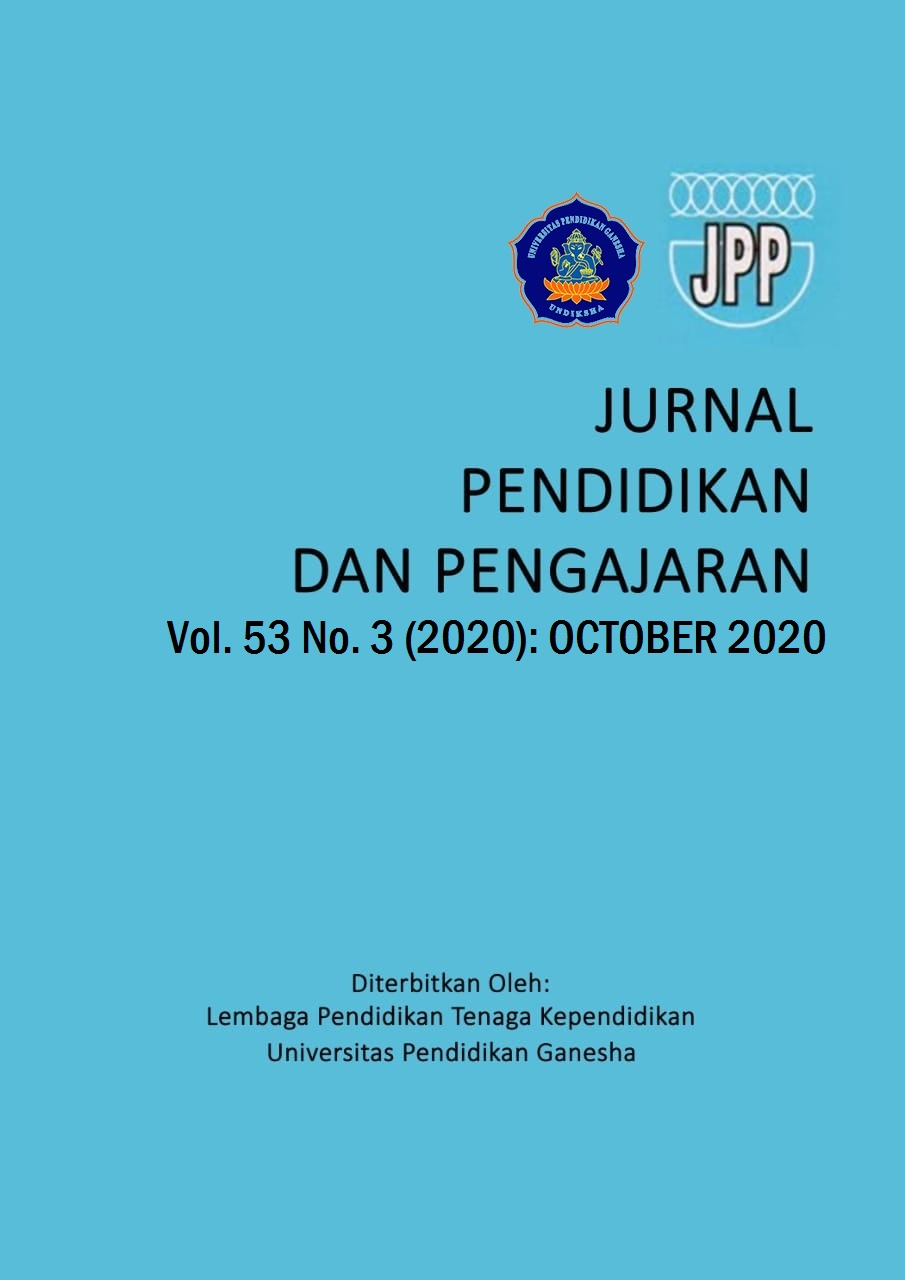Implementation of Inquiry Based Electrical and Electronic Instructional Module in Vocational School
DOI:
https://doi.org/10.23887/jpp.v53i3.25907Keywords:
Modules, Inquiry, Basic Electricity and ElectronicsAbstract
The importance of modules in learning as enhancing student learning outcomes. Thus, it is necessary to conduct a needs analysis for the development of inquiry-based modules in improving student learning outcomes.Thus, through this module students are taught to study independently and think critically. This study aims to conduct a needs analysis of the implementation of inquiry-based learning modules in basic subjects of electricity and electronics. This type of research is a qualitative descriptive study. The respondents chosen in this study were subject teachers and tenth grade students of Audio Video Engineering in Vocational Schools in Padang, which were 70 students and randomly selected. The instrument used in this study was an observation sheet in the form of a questionnaire (yes-no Question). The results of the study shows that students need inquiry-based modules more than books or other independent teaching materials in which 100% of students answered needing independent teaching materials and 80% of students answered needing modules.
References
Arantika, J., Saputro, S., & Mulyani, S. (2018). Student’s Need Analysis for the Development of Chemistry Modules Based Guided Inquiry to Improve Science Process Skill. IJPTE : International Journal of Pedagogy and Teacher Education, 2(January), 45. https://doi.org/10.20961/ijpte.v2i0.19750
Arthur A. Carin, R. B. S. (1997). Teaching Science through Discovery. Ohio: Merril Publishing Co.
Chu Samuel et al. (2017). 21st Century Skills Development Through Inquiry- Based Learning.
Deti Rostika, P. (2019). Pemahaman Guru Tentang Pendekatan Saintifik dan Implikasinya dalam Penerapan Pembelajaran di Sekolah Dasar. 11(1), 86–94.
Dick Walter; Carey Lou; O Carey James. (2015). The Systematic Design of Instruction. In Journal of Petrology. https://doi.org/10.1017/CBO9781107415324.004
Endryansyah., N. H. . (2014). Pengaruh Penggunaan Pendekatan Ilmiah (Scientific Approch) dalam Pembelajaran Terhadap Hasil Belajar Siswa Kelas XII TITL 1 SMK Negeri 7 Surabaya pada Standar Kompetensi Mengoperasikan Sistem Kendali Elektromagnetik. Jurnal Pendidikan Teknik Elektro, 2(2), 25–29.
Ikhsan, M., & Prayitno, B. A. (2016). Pengembangan Modul Berbasis Inkuri Terbimbing Pada Materi Sistem Gerak Manusia Untuk Meningkatkan Hasil Belajar Siswa Kelas XI MIA SMA Negeri 1 Wera. 5(1), 133–142.
Khoirul Anam. (2017). Pembelajaran Berbasis Inkuiri: Metode dan Aplikasi. Yogyakarta: Pustaka Pelajar.
Koyama, M. (1993). Building A Two Axes Process Model Of Understanding Mathematics. Hiroshima Journal Of Mathemtics Education, 1, 63–73.
Lasmiyati, I. H. (2014). Pengembangan Modul Pembelajaran untuk Meningkatkan Pemahaman Konsep dan Minat SMP. PYTHAGORAS: Jurnal Pendidikan Matematika, 9, 161–174.
Letty Aryanti, Muhammad Anwar, Z. (2017). Pengaruh Penerapan Model Pembelajaran Inkuiri Terhadap Hasil Belajar Teknik Elektronika Dasar Siswa Kelas X SMKN 5 Padang. VOTEKNIKA, 5(2).
M.Bakhrun. (2018). Pelatihan dan Pendmapingan Implementasi Kurikulum 2013 SMK. Materi: Analisis Model Pembelajaran. Jakarta: Kemendikbud.
Praptiwi, L., Handayani, L., & Artikel, I. (2012). Efektivitas Model Pembelajaran Eksperimen Inkuiri Terbimbing Berbantuan My Own Dictionary untuk Meningkatkan Penguasaan Konsep dan Unjuk Kerja Siswa SMP RSBI. Unnes Science Education Journal, 1(2).
Reigeluth, C. M., Beatty, B. J., & Myers, R. D. (2017). Instructional-Design Theorist and Models: The Learner-Centered Paradigm Of Education, Volume IV. Newyork: Taylor and Francis.
Risman, A., & Santoso, S. (2019). Development of Guided Inquiry-Based Accounting Learning Module to Improve Students’ Learning Outcomes in State Vocational High School 1 Karanganyar. International Journal of Multicultural and Multireligious Understanding, 6(2), 846. https://doi.org/10.18415/ijmmu.v6i2.946
Rohmiyati, N., Ashadi, A., & Utomo, S. B. (2016). Pengembangan Modul Kimia Berbasis Inkuiri Terbimbing pada Materi Reaksi Oksidasi-Reduksi The Development of Chemical Modules Based Guided Inquiry in the Oxidation and Reduction Reactions Matter. Jurnal Inovasi Pendidikan IPA, 2(2), 223–229.
Rusman. (2011). Model-model Pembelajaran: Mengembangkan Profesionalisme Guru. Jakarta: PT Rajagrafindo Persada.
Sani, R. A. (2014). Pembelajaran Saintifik untuk Implementasi Kurikulum 2013. Jakarta: Bumi Aksara.
Setianingsih, E., Sunarno, W., & Sukarmin, S. (2018). Pengembangan Modul Pembelajaran Dinamika Gerak Berbasis Inkuiri Terbimbing Untuk Siswa Kelas X SMA/MA. INKUIRI: Jurnal Pendidikan IPA, 7(2), 220. https://doi.org/10.20961/inkuiri.v7i2.22978
Sipangkar, Yeni, Juliani, R dan Siregar, A. (2018). pengaruh model pembelajaran inkuiri terbimbing terhadap hasil belajar dan aktivitas siswa. Jurnal Pendidikan Fisika, 7(2), 103–109.
Sugiyono. (2008). Metode Penelitian Kuantitatif. Bandung: Alfabeta.
Tharayil, S., Borrego, M., Prince, M., Nguyen, K. A., Shekhar, P., Finelli, C. J., & Waters, C. (2018). Strategies to mitigate student resistance to active learning. International Journal of STEM Education, 5(1). https://doi.org/10.1186/s40594-018-0102-y
Ural, E. (2016). The Effect of Guided-Inquiry Laboratory Experiments on Science Education Students’ Chemistry Laboratory Attitudes, Anxiety and Achievement. Journal of Education and Training Studies, 4(4), 217–227. https://doi.org/10.11114/jets.v4i4.1395
Vlassi, M., & Karaliota, A. (2013). The Comparison between Guided Inquiry and Traditional Teaching Method. A Case Study for the Teaching of the Structure of Matter to 8th Grade Greek Students. Procedia - Social and Behavioral Sciences, 93, 494–497. https://doi.org/10.1016/j.sbspro.2013.09.226
Wardani, S., Nurhayati, S., & Safitri, A. (2016). The Effectiveness of the Guided Inquiry Learning Module towards Students. International Journal of Science and Research (IJSR), 5(6), 1589–1594. https://doi.org/10.21275/v5i6.nov164512
Wena, M. (2009). Strategi Pembelajaran Inovatif Kontenporer: Suatu Tinjauan Konseptual Operasional. Jakarta: Bumiaksara.
Yasin, M. (2014). Pengembangan Modul Transmisi Otomatis Mobil untuk Meningkan Kualitas Hasil Belajar Siswa Kelas XI di Sekolah Menengah Kejuruan. Jurnal Pendidikan, 3, 1–9.
Downloads
Published
How to Cite
Issue
Section
License
Authors who publish with Jurnal Pendidikan dan Pengajaran agree to the following terms:- Authors retain copyright and grant the journal the right of first publication with the work simultaneously licensed under a Creative Commons Attribution License (CC BY-SA 4.0) that allows others to share the work with an acknowledgment of the work's authorship and initial publication in this journal
- Authors are able to enter into separate, additional contractual arrangements for the non-exclusive distribution of the journal's published version of the work (e.g., post it to an institutional repository or publish it in a book), with an acknowledgment of its initial publication in this journal.
- Authors are permitted and encouraged to post their work online (e.g., in institutional repositories or on their website) prior to and during the submission process, as it can lead to productive exchanges, as well as earlier and greater citation of published work. (See The Effect of Open Access)





